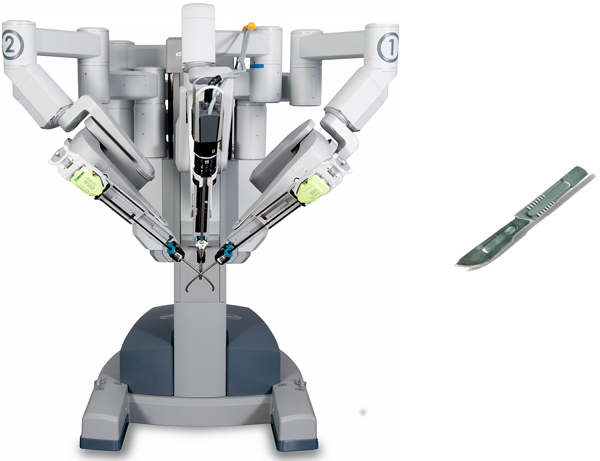 On the one hand, as I track medical device technology development, I see the increasing trend toward a reduction in the complexity of approaches to accomplish therapeutic ends.
On the one hand, as I track medical device technology development, I see the increasing trend toward a reduction in the complexity of approaches to accomplish therapeutic ends.
 On the one hand, as I track medical device technology development, I see the increasing trend toward a reduction in the complexity of approaches to accomplish therapeutic ends. The underlying force seems to be, “healthcare technology is expensive, so let’s minimize the technological complexity, minimize the invasiveness, reduce collateral damage, make treatments more specific to the resolution of symptoms and/or disease…” The result is that, for example, endoscopic surgery leads to laparoscopic surgery, which leads to single port laparoscopic surgery, which leads to natural orifice transluminal endoscopic surgery, potentially competing in its minimally invasiveness against alternatives like transcatheter interventional procedures — even for procedures like cardiac valve repair or replacement or coronary artery bypass grafting.
On the one hand, as I track medical device technology development, I see the increasing trend toward a reduction in the complexity of approaches to accomplish therapeutic ends. The underlying force seems to be, “healthcare technology is expensive, so let’s minimize the technological complexity, minimize the invasiveness, reduce collateral damage, make treatments more specific to the resolution of symptoms and/or disease…” The result is that, for example, endoscopic surgery leads to laparoscopic surgery, which leads to single port laparoscopic surgery, which leads to natural orifice transluminal endoscopic surgery, potentially competing in its minimally invasiveness against alternatives like transcatheter interventional procedures — even for procedures like cardiac valve repair or replacement or coronary artery bypass grafting.
Then, on the other hand, I see technological development moving in the entirely opposite direction of increasing complexity with developments like robotic surgical systems, intraoperative imaging and others, all of which raise the question as to whether we are simply developing technologies for technology’s sake. Do these increasingly complex technologies provide a clinical endpoint not achievable with alternative technologies, or more importantly, procedural approaches? Certainly, I think that technologies that enable a surgeon to perform a procedure that he otherwise simply could not perform, such as those involving the use of intraoperative imaging technologies that enable the surgeon to see healthy versus pathological tissues and differentiate his actions accordingly can arguably result in a better clinical outcome. And as part of this process, one must consider the cost of the accompanying technology such as imaging systems.
Accordingly, when one considers the range of different complex robotic surgical technologies on the market or under development, one has to ask whether these systems truly allow the performance of procedures that the average, well-trained surgeon could not perform without that technology. Certainly, there are complex surgical procedures, such as delicate neuro procedures that, if not performed with extremely precise accuracy, might result in serious collateral damage. But hernia repair? Appendectomy? Colon resection? Hysterectomy? Some of these fairly high-volume procedures have indeed been presented as justification for the enormous expenditure needed to acquire robotic surgical systems.
Forgive me for stating the obvious, but it seems incumbent upon healthcare systems to critically evaluate the cost/benefit of new technology, given the limited resources in healthcare.
For this reason, it does not surprise me in the least that recent reports of complications or, in the least, device problems associated with the use of Intuitive Surgical’s robotic systems have promptly led to a precipitous decline in that company’s stock value. If a technology can’t enable the performance of a procedure that otherwise could not be performed, then its value is in question. Further, if the technology cannot perform a procedure flawlessly, and without complication or error that can arguably be performed without that technology, then its value is seriously in question.






